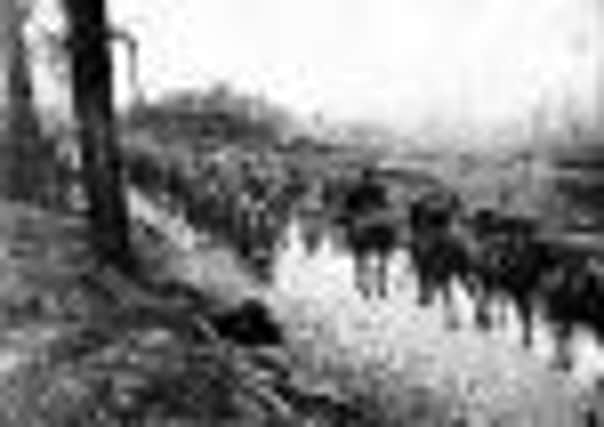We must remember the great sacrifice that made our nation


I know there will be some who wonder whether we should be making such a priority of these commemorations when money is tight and there is no-one left from the generation that fought in the Great War.
For me there are three reasons. First, there is the sheer scale of sacrifice. When they set out, none of the armies had any idea of the length and scale of the trauma that was to unfold.
Advertisement
Hide AdAdvertisement
Hide AdFor many going off to war was a rite of passage. Many were excited. They would eat better than they had when working down the mines or in the textile mills. They would have access to medical care. And many thought they would be home by Christmas anyway.
There is a story of the Russian high command asking for new typewriters and being told the war would not last long enough to justify the expenditure. As Major JV Bates from the Royal Army Medical Corps wrote: “...being our first experience of war, we men were not so much frightened as very excited...it wasn’t until after two or three weeks of continually fighting rearguard action, reconnaissance patrols, and seeing our mates killed and wounded that the real horror of it came home to us, and if everyone else was as frightened as I was, then we were all petrified.”
Four months later, one million had died in the heavy artillery battles that actually came before the digging of trenches. Four years later, the death toll of military and civilians stood at over 16 million. Nearly one million of them, Britons. Twenty thousand were killed on one day at the Battle of the Somme.
To us today, it seems so inexplicable that countries which had many things binding them together would indulge in such a never-ending slaughter.
Advertisement
Hide AdAdvertisement
Hide AdBut they did. And the death and suffering was on a scale that far outstrips any other conflict. This was the extraordinary sacrifice of a generation. It was a sacrifice they made for us. And it is right that we should remember them.
Second, it is right also to acknowledge the impact the war had on the development of Britain and indeed the world as it is today.
For all the profound trauma, the resilience and courage that was shown, the values we hold dear and the lessons we learnt changed our nation and helped to make us who we are today. It is a period of our history through which we can trace the origins of a number of really significant advances.
The extraordinary bravery of Edith Cavell whose actions gained such widespread admiration and played an important role in advancing the emancipation of women.
Advertisement
Hide AdAdvertisement
Hide AdThe loss of the troopship SS Mendi in February 1917 and the death of the first black British Army officer Walter Tull in March 1918 are not just commemorated as tragic moments, but also seen as marking the beginnings of ethnic minorities getting the recognition, respect and equality they deserve.
At the same time, there were hugely significant developments in this period which darkened our world for much of the following century. The war’s geopolitical consequences defined much of the 20th-century unleashing the forces of Bolshevism and Nazism.
And with the failure to get the peace right, the great tragedy was that the legacy of the war to end all wars was an equally cataclysmic Second World War just two decades later
For us today to fail to recognise the huge national and international significance of all these developments during the First World War would be a monumental mistake.
Advertisement
Hide AdAdvertisement
Hide AdBut there is a third reason why this matters so much. There is something about the First World War that makes it a fundamental part of our national consciousness. Put simply, this matters: not just in our heads, but in our hearts.
We look at those fast fading, sepia photographs of people posing stiffly, proudly in uniform in many cases for the first and last image ever taken of them. And this matters to us.
In total, more than £50m is being commited to these centenary commemorations. And it is absolutely right that these commemorations should be given such priority.
As a 20-year-old soldier wrote just a week before he died,“But for this war I and all the others would have passed into oblivion like the countless myriads before us, but we shall live for ever in the results of our efforts.”
Our duty with these commemorations is clear. To honour those who served. To remember those who died. And to ensure that the lessons learnt live with us for ever.
And that is exactly what we will do.